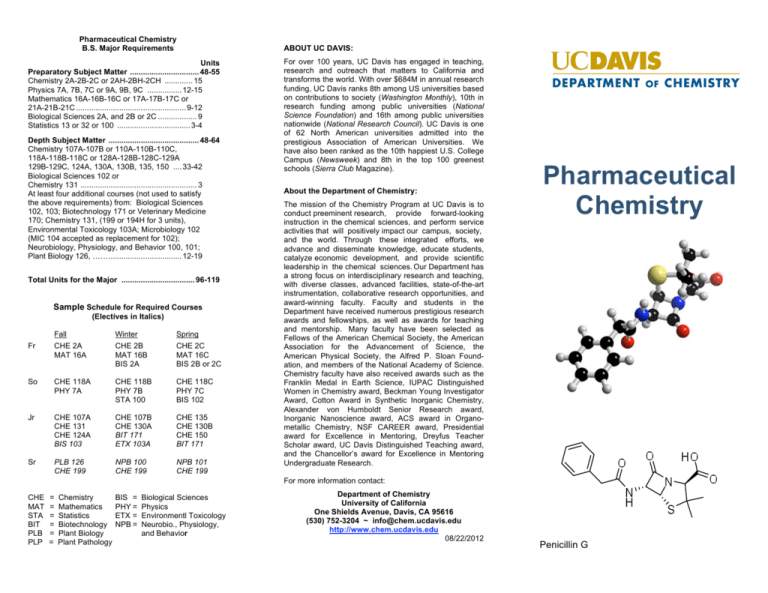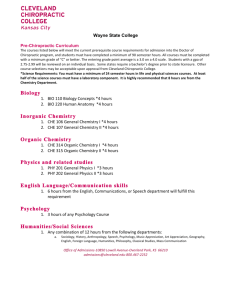Pharmaceutical Chemistry - SmartSite
advertisement

Pharmaceutical Chemistry B.S. Major Requirements Units Preparatory Subject Matter ................................ 48-55 Chemistry 2A-2B-2C or 2AH-2BH-2CH ............. 15 Physics 7A, 7B, 7C or 9A, 9B, 9C ................ 12-15 Mathematics 16A-16B-16C or 17A-17B-17C or 21A-21B-21C ................................................... 9-12 Biological Sciences 2A, and 2B or 2C .................. 9 Statistics 13 or 32 or 100 .................................. 3-4 Depth Subject Matter .......................................... 48-64 Chemistry 107A-107B or 110A-110B-110C, 118A-118B-118C or 128A-128B-128C-129A 129B-129C, 124A, 130A, 130B, 135, 150 .... 33-42 Biological Sciences 102 or Chemistry 131 ...................................................... 3 At least four additional courses (not used to satisfy the above requirements) from: Biological Sciences 102, 103; Biotechnology 171 or Veterinary Medicine 170; Chemistry 131, (199 or 194H for 3 units), Environmental Toxicology 103A; Microbiology 102 (MIC 104 accepted as replacement for 102); Neurobiology, Physiology, and Behavior 100, 101; Plant Biology 126, …….................................. 12-19 Total Units for the Major .................................. 96-119 Sample Schedule for Required Courses (Electives in Italics) Fall Winter Spring Fr CHE 2A MAT 16A CHE 2B MAT 16B BIS 2A CHE 2C MAT 16C BIS 2B or 2C So CHE 118A PHY 7A CHE 118B PHY 7B STA 100 CHE 118C PHY 7C BIS 102 Jr CHE 107A CHE 131 CHE 124A BIS 103 CHE 107B CHE 130A BIT 171 ETX 103A CHE 135 CHE 130B CHE 150 BIT 171 Sr PLB 126 CHE 199 NPB 100 CHE 199 NPB 101 CHE 199 ABOUT UC DAVIS: For over 100 years, UC Davis has engaged in teaching, research and outreach that matters to California and transforms the world. With over $684M in annual research funding, UC Davis ranks 8th among US universities based on contributions to society (Washington Monthly), 10th in research funding among public universities (National Science Foundation) and 16th among public universities nationwide (National Research Council). UC Davis is one of 62 North American universities admitted into the prestigious Association of American Universities. We have also been ranked as the 10th happiest U.S. College Campus (Newsweek) and 8th in the top 100 greenest schools (Sierra Club Magazine). About the Department of Chemistry: The mission of the Chemistry Program at UC Davis is to conduct preeminent research, provide forward-looking instruction in the chemical sciences, and perform service activities that will positively impact our campus, society, and the world. Through these integrated efforts, we advance and disseminate knowledge, educate students, catalyze economic development, and provide scientific leadership in the chemical sciences. Our Department has a strong focus on interdisciplinary research and teaching, with diverse classes, advanced facilities, state-of-the-art instrumentation, collaborative research opportunities, and award-winning faculty. Faculty and students in the Department have received numerous prestigious research awards and fellowships, as well as awards for teaching and mentorship. Many faculty have been selected as Fellows of the American Chemical Society, the American Association for the Advancement of Science, the American Physical Society, the Alfred P. Sloan Foundation, and members of the National Academy of Science. Chemistry faculty have also received awards such as the Franklin Medal in Earth Science, IUPAC Distinguished Women in Chemistry award, Beckman Young Investigator Award, Cotton Award in Synthetic Inorganic Chemistry, Alexander von Humboldt Senior Research award, Inorganic Nanoscience award, ACS award in Organometallic Chemistry, NSF CAREER award, Presidential award for Excellence in Mentoring, Dreyfus Teacher Scholar award, UC Davis Distinguished Teaching award, and the Chancellor’s award for Excellence in Mentoring Undergraduate Research. Pharmaceutical Chemistry For more information contact: CHE MAT STA BIT PLB PLP = = = = = = Chemistry Mathematics Statistics Biotechnology Plant Biology Plant Pathology BIS = PHY = ETX = NPB = Biological Sciences Physics Environmentl Toxicology Neurobio., Physiology, and Behavior Department of Chemistry University of California One Shields Avenue, Davis, CA 95616 (530) 752-3204 ~ info@chem.ucdavis.edu http://www.chem.ucdavis.edu 08/22/2012 Penicillin G Pharmaceutical Chemistry The B.S. in Pharmaceutical Chemistry provides students with an in-depth understanding of the experimental and computational processes and societal issues that surround the discovery and design of modern pharmaceuticals. Important relevant topics include potential drug targets, physical principles of drug action, drug synthesis and screening, rational drug design, drug delivery, and ethical concerns. Program of Study Students in the Pharmaceutical Chemistry major program require and receive a strong background in chemistry, physics, mathematics, and biology. However, the principal foci of the emphasis are the design principles and experimental methods used in pharmaceutical and medicinal chemistry. Ibuprofen is a non-steroidal anti-inflammatory drug (NSAID) widely marketed under various trademarks. It is used for relief of symptoms of arthritis, primary dysmenorrhoea, fever, and as an analgesic, especially where there is an inflammatory component. For example, case studies of various drugs (e.g., aspirin, botox, thalidomide, taxol) are used to discuss and present various computational methods that are important and widely used in the modern drug design/discovery process. Atorvastatin, a member of the drug class known as statins, is used for lowering cholesterol and thereby reducing cardiovascular disease. With 2004 sales of US$10.9 billion under the brand name Lipitor 2+ (Ca -salt of atorvastatin), it is the largest selling drug in the world. The preparatory subject matter for the emphasis includes one year of general chemistry with lab, one year of physics with lab, one year of calculus, two quarters of biology with lab and one quarter of statistics. This material should normally be completed before embarking on the depth subject matter. The minimum depth subject matter includes one year of organic chemistry with lab, two quarters of physical chemistry, one quarter of inorganic chemistry, one quarter of natural products chemistry, two quarters of pharmaceutical chemistry, one quarter of advanced bioorganic chemistry laboratory, plus several restricted elective courses chosen from chemistry, biological sciences, environmental toxicology, neurobiology, physiology, and behavior, plant biology and plant pathology. Career Alternatives Students with a bachelor’s degree in pharmaceutical chemistry are employed in all aspects of the pharmaceutical and other health related industries. Students are also well prepared for graduate study in a range of areas, including chemistry, medicinal chemistry, biochemistry, and pharmacology, and for professional schools in pharmacy, dentistry and medicine. The demand for pharmaceutical chemists is high and anticipated to grow, as modern chemistry allows a wide range of choices for drug synthesis and our growing knowledge of biological processes provides challenging targets for novel therapeutics. Student places a sample in a nuclear magnetic resonance (NMR) spectrometer. NMR spectroscopy is an important tool to characterize molecules and is the basis of magnetic resonance imaging (MRI). Students learn about the rational design of drugs, their multi-step synthesis, purification and characterization, and the determination of their physical properties and biological activity. Fluorouracil is a chemotherapy drug for the treatment of various types of cancer. One of its potential side effects is loss of hair.





